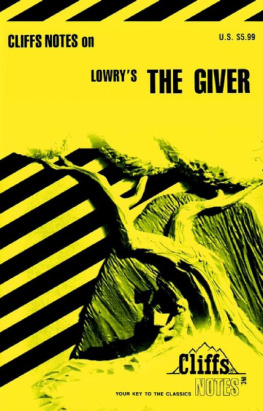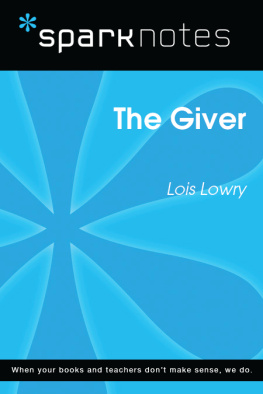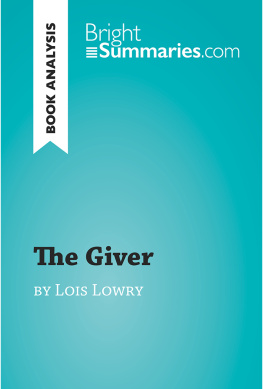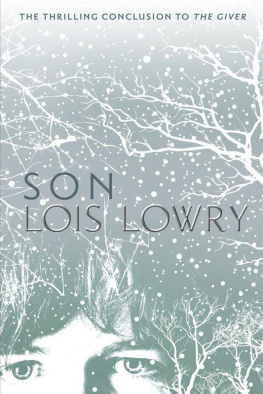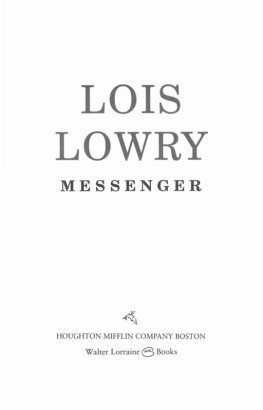Text 1993 by Lois Lowry
Newbery acceptance speech 1994 by Lois Lowry
Introduction 2011 by Lois Lowry
Illustrations 2011 by Bagram Ibatoulline
All rights reserved. Originally published in hardcover in the United States by Houghton Mifflin Books for Children, an imprint of Houghton Mifflin Harcourt Publishing Company, 1993.
For information about permission to reproduce selections from this book, write to Permissions, Houghton Mifflin Harcourt Publishing Company, 215 Park Avenue South, New York, New York 10003.
www.hmhco.com
The Library of Congress has cataloged the print edition as follows:
Lowry, Lois.
The giver/ by Lois Lowry.
p. cm.
Summary: Given his lifetime assignment at the Ceremony of Twelve, Jonas becomes the receiver of memories shared by only one other in his community and discovers the terrible truth about the society in which he lives.
ISBN: 978-0-547-42477-4
[1. Science fiction.] I. Title
PZ7.L9763Gi 1993
92-15034
[Fic]dc20 CIP AC
eISBN 978-0-547-94696-2
v4.0415
For all the children
To whom we entrust the future
Introduction
When I sat down, close to twenty years ago, to write the book that would eventually be The Giver, I thought I was writing an adventure story. I had been musing a lot about the concept of memory, and what our lives would be like if some technology had allowed our memories to become selective, so that we could discard those that caused us discomfort. It was the kind of what if... speculation that often propels the writing of fiction.
It was very soon after the books publication that I began to perceive the impact that the simple premise of it had on people of all ages, from all walks of life. They began to write to meor about mealmost immediately. They continue to, all these years later.
One man who had fled the religious cult in which he had been raised told me that his psychiatrist had given him The Giver to read.
A woman told me that Jesus would be ashamed of me, for writing such a book.
An Episcopal priest gave copies of it to his vestry members for Christmas.
A website called me the Antichrist.
And it became the de rigueur gift for hundreds of Bar Mitzvah boys.
I was interviewed often by journalists reporting on the increasing number of challenges to The Giver, and I never knew quite what to say. It was hard for me to figure out exactly what it was about the book was evoking such passion in readers.
Ironically, it was a teenager who finally explained it for me, when she wrote in gratitude, thanking me for writing a book about adults who keep secrets from young people and reassuring young readers that they can break free from that into a world of honesty and empowerment.
There have been, in recent years, a startling number of dystopian novels published for young people. Most of them are intriguing and almost all of them are much more complex than The Giver ever was or tried to be. Why is it that, with so many other choices, this long-ago-published book continues to be the one that still fascinates and outrages and engages its readers?
Its because it describes the power that even a twelve-year-old can have: the power to expose human hypocrisy, to shatter secrecy, to shine a light on truth, and to feel the freedom that lies beyond.
Lois Lowry, 2011
Chapter 1
I T WAS ALMOST DECEMBER, and Jonas was beginning to be frightened. No. Wrong word, Jonas thought. Frightened meant that deep, sickening feeling of something terrible about to happen. Frightened was the way he had felt a year ago when an unidentified aircraft had overflown the community twice. He had seen it both times. Squinting toward the sky, he had seen the sleek jet, almost a blur at its high speed, go past, and a second later heard the blast of sound that followed. Then one more time, a moment later, from the opposite direction, the same plane.
At first, he had been only fascinated. He had never seen aircraft so close, for it was against the rules for Pilots to fly over the community. Occasionally, when supplies were delivered by cargo planes to the landing field across the river, the children rode their bicycles to the riverbank and watched, intrigued, the unloading and then the takeoff directed to the west, always away from the community.
But the aircraft a year ago had been different. It was not a squat, fat-bellied cargo plane but a needle-nosed single-pilot jet. Jonas, looking around anxiously, had seen othersadults as well as childrenstop what they were doing and wait, confused, for an explanation of the frightening event.
Then all of the citizens had been ordered to go into the nearest building and stay there. IMMEDIATELY , the rasping voice through the speakers had said. LEAVE YOUR BICYCLES WHERE THEY ARE.
Instantly, obediently, Jonas had dropped his bike on its side on the path behind his familys dwelling. He had run indoors and stayed there, alone. His parents were both at work, and his little sister, Lily, was at the Childcare Center where she spent her after-school hours.
Looking through the front window, he had seen no people: none of the busy afternoon crew of Street Cleaners, Landscape Workers, and Food Delivery people who usually populated the community at that time of day. He saw only the abandoned bikes here and there on their sides; an upturned wheel on one was still revolving slowly.
He had been frightened then. The sense of his own community silent, waiting, had made his stomach churn. He had trembled.
But it had been nothing. Within minutes the speakers had crackled again, and the voice, reassuring now and less urgent, had explained that a Pilot-in-Training had misread his navigational instructions and made a wrong turn. Desperately the Pilot had been trying to make his way back before his error was noticed.
NEEDLESS TO SAY, HE WILL BE RELEASED , the voice had said, followed by silence. There was an ironic tone to that final message, as if the Speaker found it amusing; and Jonas had smiled a little, though he knew what a grim statement it had been. For a contributing citizen to be released from the community was a final decision, a terrible punishment, an overwhelming statement of failure.

Even the children were scolded if they used the term lightly at play, jeering at a teammate who missed a catch or stumbled in a race. Jonas had done it once, had shouted at his best friend, Thats it, Asher! Youre released! when Ashers clumsy error had lost a match for his team. He had been taken aside for a brief and serious talk by the coach, had hung his head with guilt and embarrassment, and apologized to Asher after the game.
Now, thinking about the feeling of fear as he pedaled home along the river path, he remembered that moment of palpable, stomach-sinking terror when the aircraft had streaked above. It was not what he was feeling now with December approaching. He searched for the right word to describe his own feeling.
Jonas was careful about language. Not like his friend, Asher, who talked too fast and mixed things up, scrambling words and phrases until they were barely recognizable and often very funny.
Jonas grinned, remembering the morning that Asher had dashed into the classroom, late as usual, arriving breathlessly in the middle of the chanting of the morning anthem. When the class took their seats at the conclusion of the patriotic hymn, Asher remained standing to make his public apology as was required.
I apologize for inconveniencing my learning community. Asher ran through the standard apology phrase rapidly, still catching his breath. The Instructor and class waited patiently for his explanation. The students had all been grinning, because they had listened to Ashers explanations so many times before.
Next page

